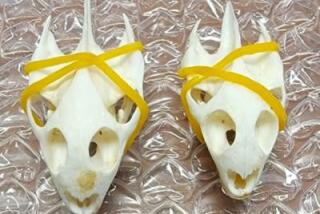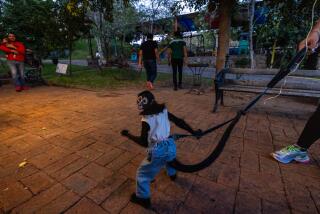Jury Weighing Issues in Rare Zebra Skins Case : Wildlife: A safari leader is being tried for bringing the hides to the United States, where the sale of such pelts from the threatened species is illegal.
A federal court jury in Los Angeles was asked to decide Wednesday whether a South African safari tour leader illegally imported nine skins from a rare and threatened species of zebra and tried to peddle them in Orange County.
The prosecution contends that Wallace Charles Venter, 37, knew it was illegal to sell the Hartmann’s Mountain Zebra skins in the United States and had written a letter to the U.S. Fish and Wildlife Service saying that the skins were not intended for sale.
But in August and September, Venter placed two classified ads in the Orange County Register offering to sell zebra hides for up to $1,900, according to documents prepared by the prosecution. An anonymous reader called Fish & Wildlife to complain, and Venter was arrested in September after he allegedly sold one of the skins to an undercover agent.
Venter’s attorney, Morton H. Boren, said Venter leads safari tours in South Africa and came to the United States “to see if he could drum up business.” Boren said Venter did not sell the skin but was merely using it as collateral while he arranged the sale of other, legally imported skins. Venter thought that transaction was perfectly legal, Boren said.
“The law is really confused,” Boren said. “He honestly believed it was OK for him to use one or two of these skins for collateral. . . . If he was going to sell these skins illegally, he would just sell them and split.”
Venter is charged with importing nine skins for sale, selling one skin, and making a false statement to a government official, Boren said.
The U.S. government considers the Hartmann’s Mountain Zebra a “threatened” species, which means that it is likely to become an endangered species within the foreseeable future.
Unlike the common black-and-white zebra, the Hartmann’s zebra is brown and buff colored and has an unusual pattern of cross-bar stripes. At last count in 1985, there were only 7,000 of the animals left in Southwest Africa and neighboring Angola.
Boren said Venter’s zebra hides were taken with the approval of South African authorities as part of a drought cull.
“The herd was too big for the water supply, so they captured and destroyed 40 to 60 of them,” Boren said. The skins were sold to a tannery, which sold them to a friend of Venter’s, who asked Venter to bring them to the United States, he said.
“And he thought, ‘Well, if Americans can buy them there, when I’m in America why don’t I see about taking orders for them in South Africa, with all the (proper) documents,’ ” Boren explained.
Federal law forbids importing threatened species for commercial activities, including their sale, but it does allow tourists to bring the skins home for their own personal and non-commercial use.
Assistant U.S. Atty. John S. Wiley Jr. would not comment on the case as the jury was deliberating Wednesday.
But according to the prosecution’s memorandum, Venter had begun trying to sell the skins even before they were brought to Los Angeles on Aug. 29.
Dressed in his safari suit and speaking with a noticeable accent, Venter visited a Fish and Wildlife Service office and picked up information about wildlife-import regulations, and placed several calls to the department on Aug. 1, the memo said.
The first newspaper ad, which began appearing on Aug. 26, said, “African Games Skins, zebra, Springbok Etc. $50,” followed by a Long Beach-area telephone number. The second ad offered “Zebra skins, $1,900,” the memo said.
On about Aug. 30, a 27-year-old Yorba Linda man called Venter and asked about buying the skins.
“He had a real heavy accent, South African,” said Donald K. Augustine, who was called to testify at the trial. “We joked about the problems over in South Africa. He was a nice man, he really was, considering . . . “
Augustine said that Venter promised to bring the skins to his office in Orange for examination. Augustine said he had friends who had brought zebra skins back from safaris and had no idea that the skins Venter was selling belonged to a threatened species.
“He had to know it was illegal,” Augustine said in an interview Wednesday.
“I asked him, ‘Is this legal?’ and he said ‘Yeah.’ I said, ‘You’ve got permission?’ He said, ‘Yeah.’ ”
But Venter never showed up for the appointment and Augustine dropped the matter until federal prosecutors found his telephone number among Venter’s papers and called him to testify.
When the skins arrived in Los Angeles, a customs inspector thought the shipment was unusual and asked for a notarized affidavit from Venter that they were for personal and not commercial use, the memo said.
Venter did write a letter saying that the skins were purchased by a man named Sidowski, and that five would be used to decorate Sidowski’s house and the other four would be used by Venter as a backdrop for photographs to promote his safari business, the prosecution’s memo said.
The letter added, “There is no intention of selling them.”
When customs officials opened the crate, they found the zebra skins as well as a stuffed Nile crocodile, which is an endangered species that is not permitted in this country under any circumstances, the memo said.
The crocodile was seized, but prosecutors could not locate Sidowski and are not sure whether such a person exists, the memo said.
The zebra skins were shown to the jury and introduced into evidence. In his closing statement, Boren said that the jury should not be swayed by their emotions toward killing wildlife, but should focus strictly on the legal issues involved. The case is being heard by U.S. District Court Judge William D. Keller.
More to Read
Sign up for Essential California
The most important California stories and recommendations in your inbox every morning.
You may occasionally receive promotional content from the Los Angeles Times.










